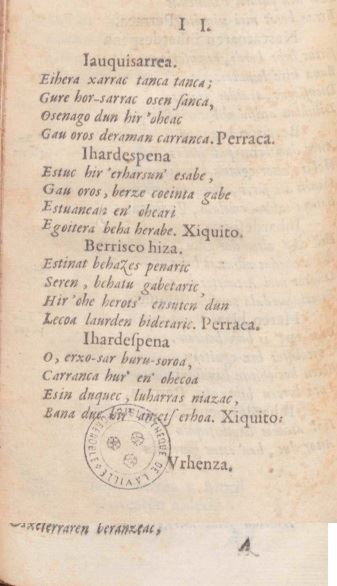Three unknown poems by Oihenart found
Euskaraz irakurri: Oihenarten hiru poem ezezagun aurkitu dituzte
The professor of the Department of Classical Studies at the University of the Basque Country Gidor Bilbao has found three hitherto unknown poems (a total of 83 verses) by the Basque poet, lawyer, historian and politician Arnaut Oihenat (Maule-Lextarre 1592 – Donapaleu 1668). The discovery took place, according to Bilbao has explained to the journalist Miel A Elustondo in an interview published by the association of Basque writers, Euskal Idazleen Elkartea, through the Internet, in a hitherto unknown copy of the work “Kobla berriak” that was in a Grenoble library.
Exactly, it is about seven stanzas and two complete poems (“Jorraleen koblak I” and “Jorraleen koblak II”) that were not published in the copies located so far of the work “Kobla berriak”, and the researcher has affirmed to EITB that This fact opens a hopeful path for future researchers, since it shows that Oihenart “modified and completed his writings with corrections, changes and amendments” even after they were printed.
Regarding the seven stanzas discovered, during the interview Bilbao told Elustondo that they are “classic couplets” in which a lyrical self laments the long lines he receives from someone he loves. “In these couplets, Oihenart uses a metric that he does not use in any other poem, and I think this brings out one of the author’s main objectives, which is to demonstrate that there is room for all kinds of metrics in Basque-language poetry,” he adds Bilbao. These are the first four verses of this poetry, adapted to Basque batua by Bilbao:
“Denbora batez, irabazi
you are new to us;
geroz, zerkbait81 gibelerazi
dakusat zerauztadala”
“Jorraleen koblak”
The other two poems, “Jorraleen koblak I” and “Jorraleen koblak II”, for their part, respond to the Suletino tradition of “xikitoak”, puyas in verse that were thrown at each other by shepherds from Zuberoa. Euskaltzaindia explains that you always had to use the formula “xikito” after launching each one of the bertsos, and in this way the interlocutor would not have to get upset, but rather answer with another bertso composed by him.

Photography provided by Gidor Bilbao
Bilbao explains that until now it was believed that only men participated in the xikitos, but “I think that from now on we would have to talk about perraka-xikitoak“: “These Oihenart couplets show us that women used the formula xikito with men, but that they called bitch to women, with the meaning of a ragged woman”.
This is how Bilbao explains it in the academic article that he has published in the specialized magazine ASJU, in which you can read all the new verses also adapted to Basque batua by the researcher himself: “If we look at Oihenart’s testimony, now we know that these dialectical battles were also carried out between men and women, and that the couplets addressed to men ended with the cry of xikitowhile those that targeted women were followed by the vocative bitch“.
Both poems are quite offensive (“Bata hordi, bertze hor(i) ito / orok ez balio bi behito / Hor den putarik handienak / erran bezat niri “xikito”. Perraka”), so Bilbao does not consider it unreasonable that they did not appear in other known copies of the work due to possible censorship.
Source: Eitb
Bruce is a talented author and journalist with a passion for entertainment . He currently works as a writer at the 247 News Agency, where he has established himself as a respected voice in the industry.











